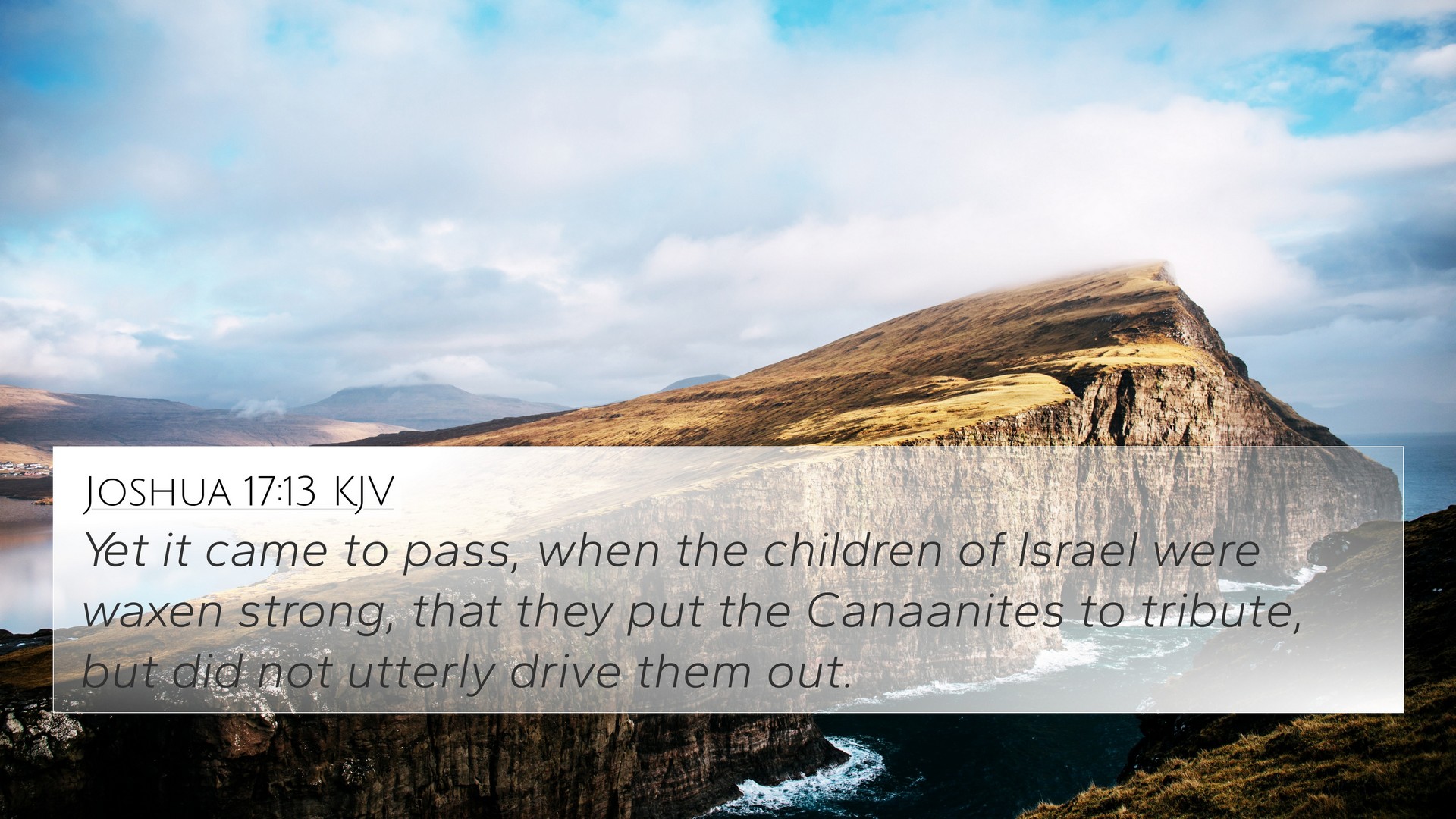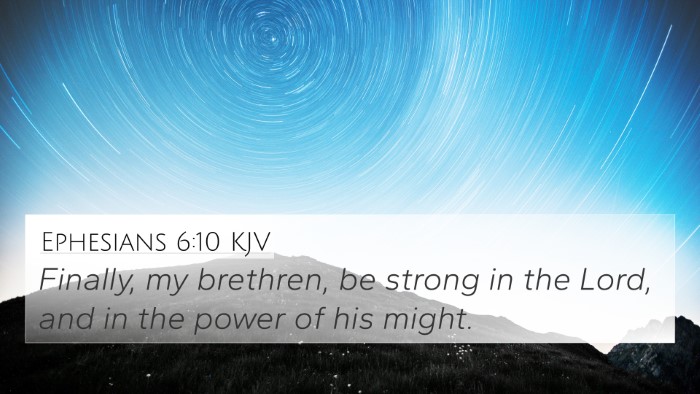Old Testament
Genesis Exodus Leviticus Numbers Deuteronomy Joshua Judges Ruth 1 Samuel 2 Samuel 1 Kings 2 Kings 1 Chronicles 2 Chronicles Ezra Nehemiah Esther Job Psalms Proverbs Ecclesiastes Song of Solomon Isaiah Jeremiah Lamentations Ezekiel Daniel Hosea Joel Amos Obadiah Jonah Micah Nahum Habakkuk Zephaniah Haggai Zechariah MalachiJoshua 17:13 Similar Verses
Joshua 17:13 Cross References
Yet it came to pass, when the children of Israel were waxen strong, that they put the Canaanites to tribute, but did not utterly drive them out.
Uncover the Rich Themes and Topics of This Bible Verse
Listed below are the Bible themes associated with Joshua 17:13. We invite you to explore each theme to gain deeper insights into the Scriptures.
Joshua 17:13 Cross Reference Verses
This section features a detailed cross-reference designed to enrich your understanding of the Scriptures. Below, you will find carefully selected verses that echo the themes and teachings related to Joshua 17:13 KJV. Click on any image to explore detailed analyses of related Bible verses and uncover deeper theological insights.
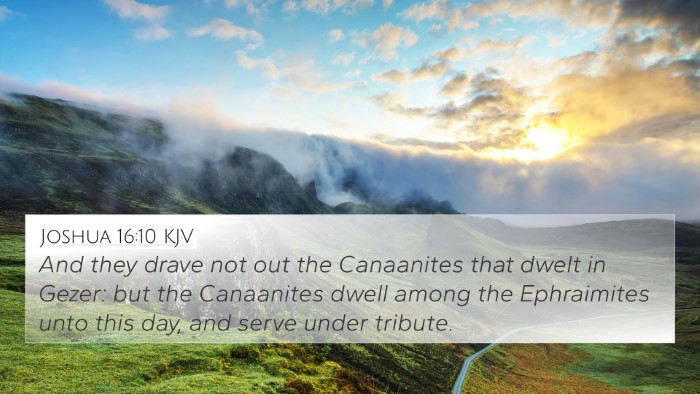
Joshua 16:10 (KJV) »
And they drave not out the Canaanites that dwelt in Gezer: but the Canaanites dwell among the Ephraimites unto this day, and serve under tribute.
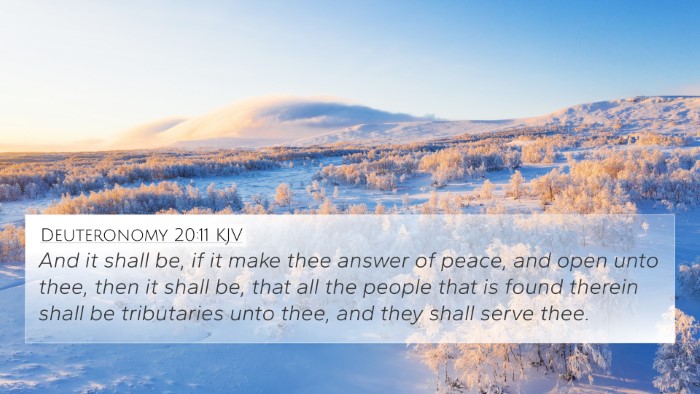
Deuteronomy 20:11 (KJV) »
And it shall be, if it make thee answer of peace, and open unto thee, then it shall be, that all the people that is found therein shall be tributaries unto thee, and they shall serve thee.
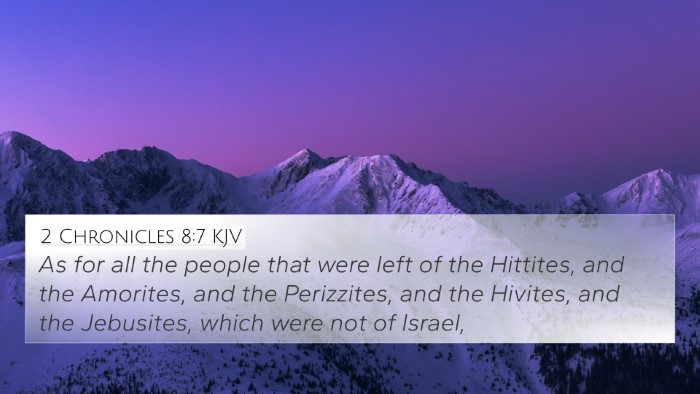
2 Chronicles 8:7 (KJV) »
As for all the people that were left of the Hittites, and the Amorites, and the Perizzites, and the Hivites, and the Jebusites, which were not of Israel,

2 Samuel 3:1 (KJV) »
Now there was long war between the house of Saul and the house of David: but David waxed stronger and stronger, and the house of Saul waxed weaker and weaker.
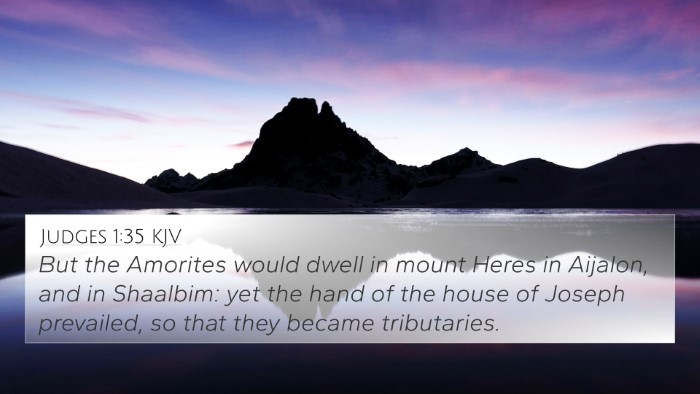
Judges 1:35 (KJV) »
But the Amorites would dwell in mount Heres in Aijalon, and in Shaalbim: yet the hand of the house of Joseph prevailed, so that they became tributaries.
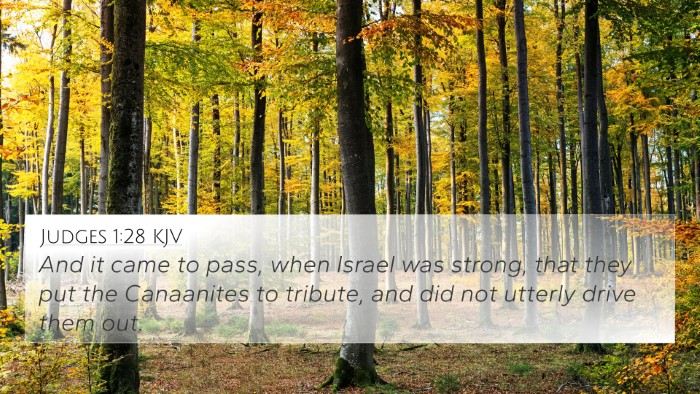
Judges 1:28 (KJV) »
And it came to pass, when Israel was strong, that they put the Canaanites to tribute, and did not utterly drive them out.
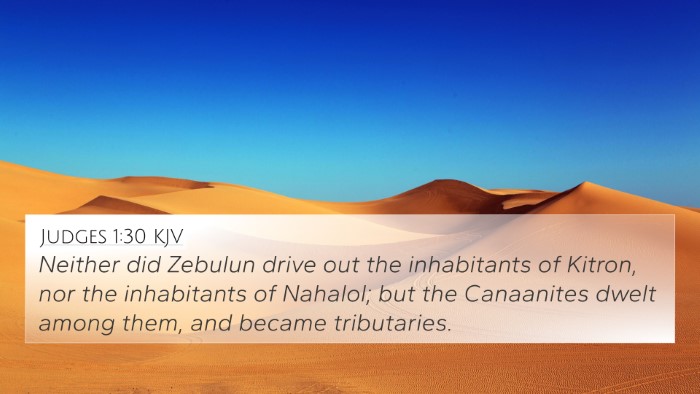
Judges 1:30 (KJV) »
Neither did Zebulun drive out the inhabitants of Kitron, nor the inhabitants of Nahalol; but the Canaanites dwelt among them, and became tributaries.
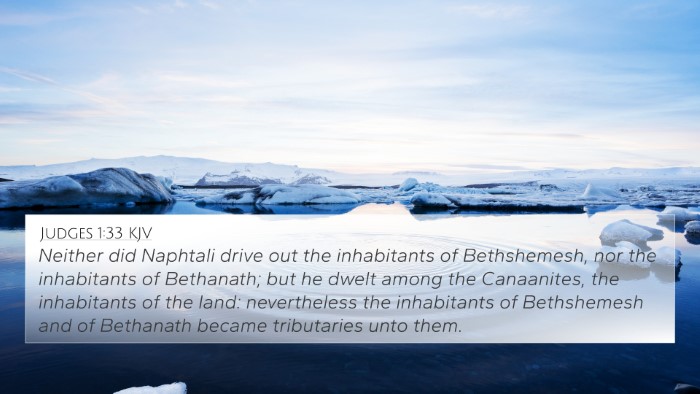
Judges 1:33 (KJV) »
Neither did Naphtali drive out the inhabitants of Bethshemesh, nor the inhabitants of Bethanath; but he dwelt among the Canaanites, the inhabitants of the land: nevertheless the inhabitants of Bethshemesh and of Bethanath became tributaries unto them.

2 Peter 3:18 (KJV) »
But grow in grace, and in the knowledge of our Lord and Saviour Jesus Christ. To him be glory both now and for ever. Amen.
Joshua 17:13 Verse Analysis and Similar Verses
Understanding Joshua 17:13
Joshua 17:13 states: "Yet it came to pass, when the children of Israel were waxen strong, that they put the Canaanites to tribute; but did not utterly drive them out."
Contextual Background
The context of Joshua 17:13 is situated within the broader narrative of the Israelites' conquest of Canaan. This verse falls within the distribution of land among the tribes after their settlement in the Promised Land. The actions described reflect the ongoing struggle between the Israelites and the remaining Canaanite populations amidst their growing power.
Commentary Insights
- Matthew Henry: Henry emphasizes the significance of divine assistance in the Israelite victories and critiques their decision not to utterly destroy the Canaanites. He notes the danger of partial obedience and the eventual consequences it brings, implying that the Israelites' strength was given by God, and their failure to follow through completely led to future challenges.
- Albert Barnes: Barnes elaborates on the notion of tribute, explaining that while the Israelites were strong enough to drive out the Canaanites, they opted instead to impose tribute upon them. This reflects a compromise and indicates an unresolved issue in the conquest that would lead to problems later on, as cohabitation with idolaters could dilute Israel's fidelity to God.
- Adam Clarke: Clarke discusses the implications of leaving Canaanites in the land, arguing that their presence would lead to a degeneracy in the worship of the true God. He highlights the moral and spiritual ramifications of not fully executing God’s command to eradicate the influences of idolatry, which was prevalent among the Canaanites.
Bible Verse Cross-References
Several Bible verses enhance the understanding of Joshua 17:13 through thematic and narrative connections:
- Judges 1:28-29: This passage highlights the ongoing struggle with the Canaanites, further explaining Israel's reluctance to drive them from the land.
- Deuteronomy 7:2: God commands the Israelites to completely destroy the Canaanite nations, giving context to their failure as depicted in Joshua 17.
- 1 Kings 11:1-2: This scripture illustrates the dangers of associating with foreign peoples, tying back to the consequences of Israel's compromise in Joshua's time.
- Psalm 106:34-36: Here, the psalmist laments Israel’s failure to obey God’s commands in driving out the nations, connecting directly with the historical accounts in Joshua.
- Exodus 23:33: This verse contains God's warning to not allow the inhabitants of the land to dwell among them, illuminating the lack of complete obedience in Joshua 17:13.
- Ezra 9:1-2: Reflecting on the consequences of intermingling with Canaanite populations, this contributes to an understanding of the long-term impact of the initial compromise.
- Matthew 15:14: Jesus speaks of the blind leading the blind, paralleling the dangers of allowing remaining Canaanites to live among the Israelites, thus affecting their spiritual walk.
- Revelation 2:14: This verse warns against false teachings, akin to the influences that the Canaanites represented, showing that the issues started in Joshua's time continued to resonate later in Biblical history.
- Romans 12:2: The apostolic admonition to not conform to the patterns of this world resonates with the need for the Israelites to remain distinct from Canaanite practices.
- Galatians 5:9: A little yeast leavens the whole batch of dough, reflecting how one small compromise can lead to larger issues, mirroring the Israelites' choice to leave the Canaanites in the land.
Thematic Connections
The verse raises important themes relating to obedience, compromise, and the consequences of failing to follow divine guidance:
- Partial Obedience: The Israelites’ choice to impose tribute rather than drive out the Canaanites signifies a critical moment where partial obedience led to long-term spiritual and political ramifications.
- Divine Strength: Recognizing that Israel's strength came from God emphasizes the need for reliance on divine power in overcoming challenges.
- Spiritual Consequences: The presence of the Canaanites symbolizes the dangers of maintaining worldly influences, which parallels modern struggles in holding onto faith amidst secular pressures.
Conclusion
In conclusion, Joshua 17:13 provides rich implications for understanding God's command, Israel's actions, and the broader themes of obedience within the scriptural narrative. The interplay of human choices and divine instruction underscores the importance of adhering fully to God's guidelines. As readers explore connections between this verse and others, they can derive insights that illuminate both historical contexts and contemporary applications of faith in their own lives.
